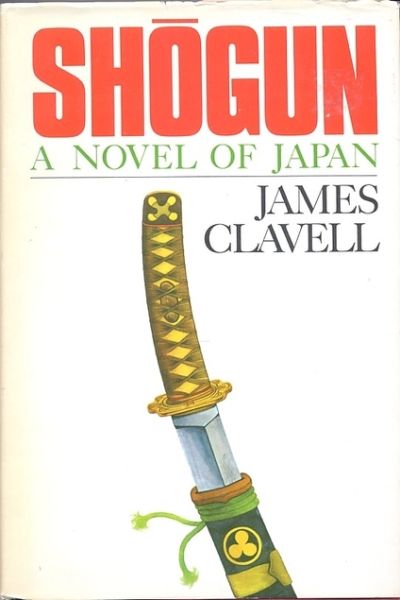Just a Castaway
Shōgun (Asian Saga, volume 1)
By James Clavell

25 May, 2019
James Clavell’s 1975 Shōgun is the first (by internal chronology) volume in his Asian saga.
English pilot John Blackthorne’s foray into Asia (by papal decree the exclusive domain of Portugal) ends in disaster. The Dutch fleet in which Blackthorne serves is scattered by a storm and Blackthorne’s ship Erasmus is driven ashore on the coast of Japan. The sickly sailors are immediately detained by local authorities.
Of course, Blackthorne is a white man in an exotic land. No doubt he will play the mighty whitey card, master every skill that matters to the Japanese in a few weeks, and then remake the nation in his image.
Perhaps not.
Blackthorne has arrived in Japan at a crucial moment. After centuries of endless war, the nation has been unified under a single Taiko, the former peasant Nakamura. Before he could cement his control over all Japan, the Taiko died. Because the Taiko’s heir is too young to rule, governance is managed by five lords who were handpicked by the Taiko to serve as regents. The cunning plan; the five will spend so much time struggling amongst themselves that no one of them can succeed in taking power and ousting the heir.
While Japan mainly concerns itself with Japan, it is aware of and has contact with Europeans, although thus far of the Catholic variety. Blackthorne offers an interesting new perspective on these vexatious foreigners, whose interesting trade goods barely compensate for their barbaric ways and propensity to interfere in local politics and religion. As well, Blackthorne has skills as yet rare in Japan. He might be a useful resource for one of the regents. He’s snapped up by Yoshi Toranaga.
Toranaga has grand ambitions and a weak hand. Flamboyantly Machiavellian, he is adept at using the resources he does has to make up for the resources he lacks. The odd, unhygienic barbarian could be an asset — if he can be civilized.
~oOo~
I have no idea why, having set out to write a historical novel set in a specific place and time, Clavell then changed all the names. It’s not like Tokugawa Ieyasu or William Adams could sue for defamation. That said, the name changes are a hint that you should not take Shogun as a reliable guide to 17th century Japan. I read this as a first contact story but perhaps it’s more accurate to call it a giant Orientalist fantasy very loosely based on historical events. The fantastic element: had the Japanese murdered each other and committed suicide at the rate they do in Clavell’s setting, Japan would have been entirely depopulated some time in the Yamato Period.
One wonders what Japanese people make of Clavell’s novel. On the one hand, its take on the Japanese of 1600 is almost operatic in its … what’s the nice word for broad stereotypes? Cartoonish simplistic Iconic character types. On the other hand, Clavell’s European characters are equally operatic. Plus it’s a surprisingly positive take on Japan for a writer who survived Changi. The Japanese are often cruel and casually homicidal, but the Europeans are no better.
There are many grounds on which one could critique the book (feel free to chime in with examples in comments) but let me uncharacteristically focus on a positive: Clavell’s complete rejection of the mighty whitey trope. Blackthorne may be the primary viewpoint character in this novel, but Toranaga is the true protagonist. After much study and effort, Blackthorne becomes a marginally passable Japanese person, but he never becomes a central player in the struggle for Japan in 1600. He is simply an exotic playing piece who, had he died in a pit in a Japanese village, would not have affected the final outcome one way or another.
This might seem like a small point. Clavell was to some extent constrained by actual history (because he wasn’t writing an alternate history novel). No European became Shogun. But it is all too common for Europeans writing about Asia to give European visitors grander roles than they actually played. How hard would it have been to cast Blackthorne as the cunning advisor whose English perspective made him an Outside Context Problem for Toranaga’s enemies? Instead, he’s a bewildered immigrant who happens to have wandered into an interesting moment in history.
At almost 1200 pages this monumental potboiler is a surprisingly quick read. This may be for the same reason that the much shorter The Mote in God’s Eye moves along at a snappy pace: the novel that saw print was much, much shorter than the original draft. All hail editors!
Shōgun is available here (Amazon), here (Amazon.ca) and here (Chapters-Indigo).
